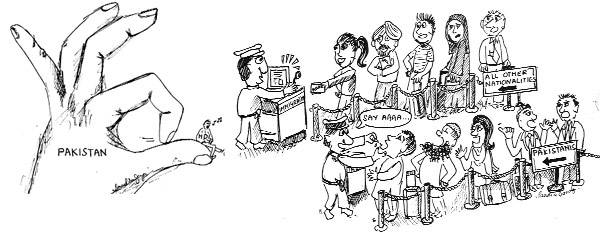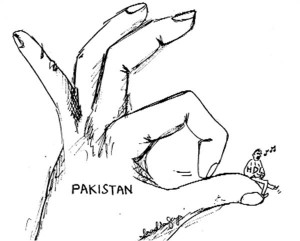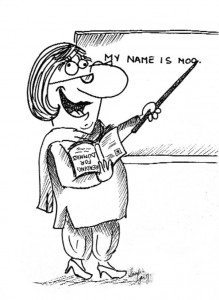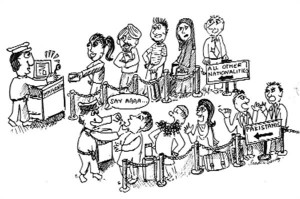
United we stand

Sir,
Through this statement, we express solidarity with the Pakistani media and working journalists, and stand against any proposed ban on any television or radio channel or newspaper.
We also urge the media owners to rise above their corporate interests and rivalries and work together against threats to and attacks upon journalists in Pakistan.
The shameful divisions in the Pakistani media are not only making journalists more vulnerable to attack and weakening our fight for justice, truth and democracy but also making us a spectacle for the world to see.
We urge the media owners/ companies to:
Support written policies / codes of ethics for the journalism work of their companies incorporating best practices on ethical journalism.
Promote policies and mechanisms that reduce the expanding margins of risks to the safety of journalists and discourage unnecessary risk taking that endanger lives in the absence of written guidelines
Support efforts for appointment of special prosecutor(s), at the federal and provincial levels, along with necessary resources, dedicated to investigating and prosecuting cases of threats against media houses and attacks against journalists
Unite in support of any journalist who is attacked or threatened, as if he or she is one of their own, even if associated with a rival company.
Beena Sarwar & Raza Rumi,
Boston.
How to be happy
Sir,
According to the United Nation Development Program’s report of Human Development Index, the position of Pakistan is 146 out of 187 countries, and value of HDI in Pakistan is 0.515. The country has had a low HDI score for decades.
Human development is the satisfaction of an individual that bring happiness to one individual as well as the whole society. I think it is the duty of the government of Pakistan not only to increase welfare spending and ensure justice and equal opportunities, but it is also important that we as individuals should stop being selfish.
If wealthy people begin to work sincerely for the welfare of the society, and people from various professions and ethnicities cooperate with each other, our country can develop. Well-off people and professions from every city, district, town or village can start education and health projects, so that we can increase our education index and life expectancy, and also generate employment.
It is such projects that make citizens truly happy, and also increase our national productivity.
Abdullah Naqi,
Karachi.
Burning questions
Sir,
TFT’s editorial of 2nd May 2014 attempted to present the security-related dimensions of Pakistan Protection Ordinance (PPO) and why it was needed given Pakistan’s peculiar situation. The editorial summarizes the ongoing debates for and against the law, and emphasizes that for reasons of national security and “existential” terrorist threat, national consensus must be hammered for the adoption of PPO at all costs even though it is “objectionable” and “deeply controversial”.
This is the current national security discourse according to which the need to explain how the limitations will contribute to the response’s effectiveness is never felt. That is where the problem lies.
When the Anti-terrorism Act 1997 was enacted it was presented as a panacea for the ills afflicting the ordinary criminal law. We were told we needed a special law to deal with special terror offences. It was ostensibly envisaged to pave way for speedy trials which the ordinary courts were incapable of delivering. Remedying the slow pace of adjudicating cases has always been the principal justification for anti-terror laws in Pakistan.
More than 15 years and dozens of “stiff” amendments later, the proponents are now admitting ATA’s ineffectiveness but only to replace it with a stiffer law. The need for empirical evidence for reasons of ATA’s failure and desirable rectification is not felt by the proponents of stiffer laws and greater executive powers.
Once again a stiffer law, i.e. PPO, is being presented as all-in-one solution to the ills of extraordinary terrorism. Ultimately, the broad and vague nature of the offences and special remedies to curb terrorism such as indefinite detention for undisclosed reasons, and guaranteed non-prosecution of illegal detentions by armed forces will cause its natural demise and without any benefits. Will we then introduce yet another stiffer law?
Here it is pertinent to refer to Actions (in Aid of Civil Power) Regulation 2011 (AIACP), a vaguely-worded law that gives sweeping powers to members of armed forces operating in tribal areas. Foremost among such powers being the power to detain, without charge or trial and for unspecified period, any individual whenever “it appears that detention of that person is expedient for peace in the area”. The Regulation was introduced with retrospective effect with a view to legalise enforced disappearances. Yet we have seen that enforced disappearances have only increased in numbers during the past 3 years.
References to Indian and the US legislation don’t help. They’re hardly the kind of experiments a nascent democracy like Pakistan should be looking up to and replicate. The ill effects of Patriot Act, TADA, POTO and UAPA on civil liberties and respective democracies have been well documented. The Patriot Act’s success is overestimated and is contested. The foiled instances of terrorism attributed to Patriot Act, for example by the Heritage Foundation, could actually have been thwarted even in the absence the law. Only a few of them could have remotely been due to powers granted to LEAs under the Act. Have the Indian policies of counter-terrorism adopted for Kashmir proved to be a success? The fact is that India being a developing country with far fewer guarantees of due process has proved to be one of the worst example in counter-terrorism measures. Failure of TADA and subsequent counter-terrorism measures in India, have also been well-documented. Kalpana Kannabiran and Ranbir Singh have dealt with the mythology surrounding the success of anti-terrorism regime in their remarkable study titled “Challenging the Rule(s) of Law: Colonialism, Criminology and Human Rights” (Sage 2008). According to official figures, from 1984 onwards till repeal, some 75,000 people were detained all over India under TADA. Of these, 73,000 cases had to be subsequently withdrawn for lack of evidence.
There is just no argument to justify the introduction of extraordinary anti-terrorist legislation which should lead to suspension of habeas corpus and other fundamental rights promised in the constitution and obligatory upon the state under the international human rights system.
The reason why the West hasn’t seen more incidents of terrorism may lie elsewhere. The US and other countries in the West may have been able to preempt incidents of terrorism through efficient intelligence, community policing and effective use of other tools. However, prosecution of terror suspects remains a serious problem. For instance, failure of UK in prosecuting IRA terror suspects is a case in point.
In the Pakistani context, the question which is not being asked, and the TFT editorialist too failed to raise it, is whether the so-called strong legislation with limitations on fundamental rights and other measures strengthening executive/LEAs powers do not ultimately prove to be corrosive of the democratic fabric of the state and civil society causing adverse long effects. Evidence would suggest an answer in the affirmative.
Today, Pakistan does not need stiffer laws like PPO but better policing, intelligence, investigation, prosecution and guaranteed due process, and a serious attempt to understand the roots of terrorism and the reasons for the failure of past counter-terrorism policies.
Asad Jamal,
Islamabad.
[Editor’s Reply: The argument about the “corrosive” effects on “democracy” of such legislation is fair enough and well established. But there are democracies and democracies, and some are able to function equally or as well (America and India and UK and Europe etc) with such legislation while others are corroded by it more or less. The argument that such laws don’t produce the desired result is wrong as shown by the Latin American, Indian, Sri Lankan, American and other experiences where terrorism, insurgency, separatism, urban warfare, etc, were all crushed or sufficiently degraded and eroded by the use of harsh laws whose effectiveness was based on the use of force, preventive detention and confessions extracted under some form of torture. Therefore instead of arguing against such a law to combat terrorism — which operates outside the ambit of given due process laws for civil society and requires a law that also operates outside the ambit of civil society — we should be detailing the “limitations” and “exceptions” to such laws in order for them to protect bonafide civil society and not “corrode” our fledgling “democracy”. Surely, we can exclude categories of bonafide party politicians, lawyers, media, rights activists, etc, from the ambit of such laws.]
Straight talk

Sir,
Some people had been saying that the government should talk to the Taliban and resolve the issue of terrorism through negotiations. But now that a dialogue is underway, the Taliban are asking for much more than they are ready to give.
The notion that the Taliban are innocent misguided people who must be given a chance to come into the mainstream is dangerous. A small minority even thinks they have a right to impose what they call the Islamic Sharia in Pakistan, but are only adopting the wrong way. But we must remember that the Taliban are terrorists, and they have carried out cruel terrorist attacks on vulnerable targets.
If they really love Islam, why do they behead innocent people, kill unarmed civilians in markets, schools, and mosques, abduct people for ransom, and fight against the Pakistani government and the will of the nation? Islam does not allow that.
As part of a global war against terrorism, Pakistan should adopt a national strategy to deal with this problem. The Pakistani state is powerful, the Pakistani nation is brave, and the Pakistani military is competent. There is no reason we should give in to unacceptable Taliban demands. The government and the army must make a resolve to take positive action and eliminate this evil, which is hurting our economy and diverting our already-scarce resources away from welfare and development.
Tariq Nazir,
Quetta.
E for effort

Sir,
Pakistan is facing an education crisis, with a literacy rate of 57 percent (including those who can only write their names). The severe decline in literacy rate has become so alarming that in this era of democracy and education, Pakistan ranks 180 amongst the 221 countries of the world in literacy.
When the PML-N government came into power last year, they had promised to increase the education budget to 4 percent of GDP. It did increase the money spent on education from 0.3 to 2.3 percent of GDP, but the proper use of this money is essential if the government wants to make a difference.
The education system in Pakistan is based on discrimination – class discrimination, gender discrimination, and geographical discrimination. And that is the key problem that the government needs to address.
According to a UNESCO report, 5.5 million children are out of school in Pakistan which is the second highest number after Nigeria. Also, Pakistan is highly unlikely to achieve the goal of 80 percent literacy by 2015. This should be a wake-up call for the government.
Ruby Zaheer,
Islamabad.
Two battles

Sir,
According to World Health Organization, there have been 74 cases of wild polio virus this year so far. Of them, 59 have been reported from Pakistan, and 46 from FATA. That means 77 percent of all polio cases occurred in the tribal areas, where the Taliban reign supreme and the writ of our state seems to have been practically surrendered in the name of dialogue.
Terrorists have assassinated vaccination officials and volunteers in the last few years. Some were kidnapped and beaten. The government took little note. The WHO warned the government several times to take necessary action to curb polio, but our leaders failed to deal with the matter. Therefore, the WHO has recommended travel restrictions for Pakistanis going abroad.
In three months now, Pakistan will have to choose between battling the Taliban and accepting polio. I think if Pakistan wins the battle against these terrorists, it will also win the battle against polio.
The basic scientific rule is that as long as a single child remains infected, children in all countries are at risk of contracting polio. Failure to eradicate polio from any country of the world could result in as many as 200,000 new cases every year, within 10 years, all over the world. And this is reason behind putting travel restrictions on Pakistanis, if UN approves WHO recommendations. Once travel restrictions are brought into practice, then every Pakistani will have to have certificate that he/she has been vaccinated.
But beyond that, the ultimate goal to make Pakistan polio-free is the duty of every Pakistani. Various research groups of epidemiologists believe that religious opposition is a major factor in the failure of immunization programs in Pakistan, along with widespread corruption, poor planning, lack of public awareness campaigns, and illiteracy.
The federal and provincial governments need to devise policies that ensure high-quality coordinated vaccination campaigns – accompanied by strong monitoring on an emergency basis, and provide protection to anti-polio workers to win the war against this cruel disease. And we must do that we are banned from entering any other country in the world.
Saifur Rehman,
Islamabad.
Power play

Sir,
I believe massive power theft is one of the main reasons for load shedding and the rising costs of electricity in our country. The government of PML-N has completely failed so far to control power theft.
We all remember that during the election campaign of 2013 and soon after coming into power in June last year, PML-N leaders promised loudly and clearly to control power theft and consequently end load shedding. It is shocking and disappointing to note that during the last 11 months, government did not take any serious action to catch electricity thieves. The minsters concerned have only been making threatening statements that made news headlines.
Last week, they disconnected electricity connections of the Prime Minister’s Secretariat, The President’s House, Parliamentary Lodges and some other federal government buildings because of default on electricity bills. Soon after the measure, the bills were paid and electricity to these buildings was restored.
The respectable ministers of water and power claimed in their press conference in Islamabad on April 2 that the move helped recover Rs 3.2 billion. While the measure made news headlines again, I would like to ask the respectable ministers how this will help control power theft. The respectable ministers of water and power did not explain why it took them 11 months to disconnect the electricity of their own government departments to recover unpaid electricity bills.
Even if the government brings additional power into the national grid, there is no surety that it will end load shedding, because there are no checks in place to ensure that the additional power will not be stolen, resulting in higher circular debts.
Ejaz Ahmad Magoon,
Lahore.

